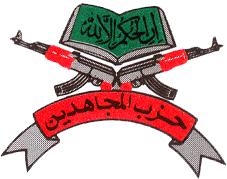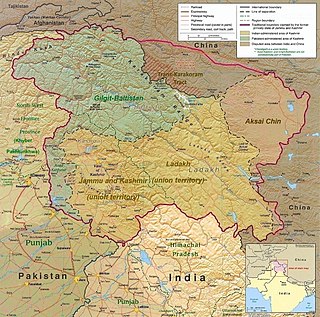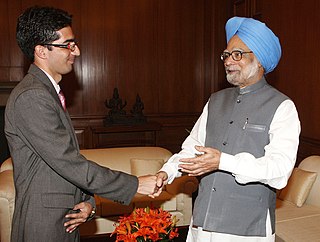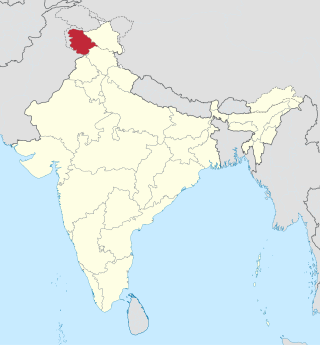Related Research Articles

Srinagar is a city in Indian-administered Jammu and Kashmir in the disputed Kashmir region. It is the largest city and summer capital of Jammu and Kashmir, which is an Indian-administered union territory. It lies in the Kashmir Valley along the banks of the Jhelum River, and the shores of Dal and Anchar lakes, between the Hari Parbat and Shankaracharya hills. The city is known for its natural environment, various gardens, waterfronts and houseboats. It is also known for traditional Kashmiri handicrafts like the Kashmir shawl, papier-mâché, wood carving, carpet weaving, and jewel making, as well as for dried fruits. It is the second-largest metropolitan area in the Himalayas.

Syed Ali Shah Geelani (1929–2021) was an Islamist, pro-Pakistani, former Jihadist, Kashmiri-separatist leader in the Indian union territory of Jammu and Kashmir, regarded as the father of the Kashmiri jihad.

Hizbul Mujahideen, also spelled Hizb-ul-Mujahideen, is an Islamist militant organization operating in the Kashmir region. Its goal is to separate Kashmir from India and merge it with Pakistan. It is one of the most important players that evolved the narrative of the Kashmir conflict from nationalism to radical jihad.

The insurgency in Jammu and Kashmir, also known as the Kashmir insurgency, is an ongoing separatist militant insurgency against the Indian administration in Jammu and Kashmir, a territory constituting the southwestern portion of the larger geographical region of Kashmir, which has been the subject of a territorial dispute between India and Pakistan since 1947.
Censorship in India has taken various forms throughout its history. Although the Constitution of India de jure guarantees freedom of expression, de facto there are various certain restrictions on content, with an official view towards "maintaining communal and religious harmony", given the history of communal tension in the nation. According to the Information Technology Rules 2011, objectionable content includes anything that "threatens the unity, integrity, defence, security or sovereignty of India, friendly relations with foreign states or public order".

Internet censorship in India is done by both central and state governments. DNS filtering and educating service users in suggested usages is an active strategy and government policy to regulate and block access to Internet content on a large scale. Also measures for removing content at the request of content creators through court orders have become more common in recent years. Initiating a mass surveillance government project like Golden Shield Project is also an alternative discussed over the years by government bodies.

Greater Kashmir is an English daily newspaper printed and published from Srinagar, the summer capital of Jammu and Kashmir. The newspaper initially began its edition in 1987 as a weekly newspaper and later, started its first daily publication in 1989.
Censorship of Twitter refers to Internet censorship by governments that block access to Twitter. Twitter censorship also includes governmental notice and take down requests to Twitter, which Twitter enforces in accordance with its Terms of Service when a government or authority submits a valid removal request to Twitter indicating that specific content is illegal in their jurisdiction.

Shah Faesal is an Indian bureaucrat currently posted as Deputy Secretary in the Ministry of Culture (India) In 2010, he became the first Kashmiri to top the Indian Civil Services Examination. He tendered his resignation from the Indian bureaucracy in protest on 9 January 2019, citing "unabated killings" in Kashmir among other things, which, reportedly, was "never accepted" by the central government and he even withdrew the same later.

Burhan Wani was a commander of Hizbul Mujahideen, an Islamist militant organization and insurgent group of the Kashmir conflict. He had become a popular figure amongst the local Kashmiri populace, having done so primarily through a strong social media presence, and was responsible for moulding the insurgency in Jammu and Kashmir into a youth-oriented movement. Wani was a militant leader and had reportedly recruited numerous foot-soldiers through his personal efforts.

The 2016–2017 unrest in Kashmir, also known as the Burhan aftermath, refers to violent protests in the Indian state of Jammu and Kashmir, chiefly in the Kashmir Valley. It started after the killing of militan leader Burhan Wani by Indian security forces on 8 July 2016. Wani was a commander of the Kashmir-based Islamist militant organisation Hizbul Mujahideen.
Zakir Rashid Bhat was a Kashmiri separatist who became the commander of Hizbul Mujahideen after the killing of Burhan Wani and Sabzar Bhat, who were the former commanders of the same outfit. He later became the chief of Ansar Ghazwat-ul-Hind.
Sabzar Ahmed Bhat was a kashmiri militant, who is the area commander of the militant organisation Hizbul Mujahideen. He was killed in an encounter by the police on 26 May 2017 at Saimoh Tral

Media in Jammu and Kashmir consists of media houses such as Greater Kashmir, Kashmir Observer, Rising Kashmir and Daily Excelsior and digital news outlets like The Dispatch , Free Press Kashmir, The Chenab Times, The Kashmir Walla, The Kashmiriyat News and radio stations such as AIR Srinagar, AIR Jammu,Radio Mirchi 98.3 FM, Red FM 93.5 and Radio Sharda. DD Kashir is state television broadcaster. Major private channels are News18 Urdu and Gulistan News.

Jammu and Kashmir is a region administered by India as a union territory and consists of the southern portion of the larger Kashmir region, which has been the subject of a dispute between India and Pakistan since 1947 and between India and China since 1959. The Line of Control separates Jammu and Kashmir from the Pakistani-administered territories of Azad Kashmir and Gilgit-Baltistan in the west and north. It lies to the north of the Indian states of Himachal Pradesh and Punjab and to the west of Ladakh which is administered by India as a union territory.
The Jammu and Kashmir Reorganisation Act, 2019 is an act of the parliament of India containing provisions to reconstitute the Indian-administered state of Jammu and Kashmir into two Indian-administered union territories (UTs) called Jammu and Kashmir, and Ladakh, and becoming effective on 31 October 2019. A bill for the act was introduced by the Minister of Home Affairs, Amit Shah, in the Rajya Sabha on 5 August 2019 and was passed on the same day. It was then passed by the Lok Sabha on 6 August 2019 and it received the president's assent on 9 August 2019.

On 6 August 2019, the Government of India revoked the special status, or autonomy, granted under Article 370 of the Indian Constitution to Jammu and Kashmir—a region administered by India as a state which consists of the larger part of Kashmir which has been the subject of dispute among India, Pakistan, and China since 1947.

The 2019–2021 Jammu and Kashmir lockdown was a preventive security lockdown and communications blackout that had been imposed throughout the Indian-administered union territory of Jammu and Kashmir following the revocation of Article 370 which lasted until February 2021, with the goal of preemptively curbing unrest, violence and protests. Most separatist leaders had and have been detained in the crackdown. The Indian government had stated that the tough lockdown measures and substantially increased deployment of security forces had been aimed at curbing terrorism. The government did not want a repeat of the death and injuries seen during the 2016–2017 Kashmir unrest.
Riyaz Ahmad Naikoo was one of the top ten most wanted militant commander of Jammu and Kashmir. He was a top commander of Hizbul Mujahideen, an Islamist Pro-Pakistan militant organization active in Jammu and Kashmir.
YFK-International Kashmir Lobby Group is a non-governmental organization working on strategies for peaceful conflict resolution and protection of human rights in the disputed region of Jammu & Kashmir. Headquartered in Islamabad, Pakistan, YFK is a registered NGO run by rotating teams of specialists in human rights, diplomacy, and international law, drawn from university scholars and students, journalists, members of the academia, young political activists, and human rights defenders from mainly Pakistan and AJK. This includes young Kashmiris from refugee families that sought exile in Pakistan after escaping violence in Kashmir post-1989. The organization advocates for the right to self-determination for Kashmiris through a plebiscite to decide whether Kashmir joins India or Pakistan, as provisioned under United Nations Security Council Resolution 47. The group apparently scaled back its operations since 2022 due to a fall in donations from inside Pakistan and the Kashmiri diaspora internationally, as Pakistan's economic crunch impacted the work of civil society organizations. Also, the political turmoil in Pakistan in 2022-2023 eclipsed all other issues.
References
- ↑ "India: Kashmir social media ban criticised". BBC News.
- ↑ "Protests in Indian Kashmir". The economist. 8 July 2008. Retrieved 10 June 2012.
- ↑ "Curbs on media in Kashmir Valley". The Hindu. 10 June 2012. Retrieved 7 July 2012.
- ↑ Magnier, Mark (8 July 2010). "Kashmir violence: A beating to go with the tea". Los Angeles Times. Retrieved 1 August 2010.
- ↑ Bhat, Aamir Ali. "A year of death, destruction and censorship in Kashmir". alaraby. Retrieved 27 April 2019.
- ↑ Lakshmi, Rema (18 July 2016). "Authorities in India shut down newspapers in strife-torn Kashmir". Washington Post.
- ↑ "Frustrations grow over social media ban in Kashmir". USA TODAY. Retrieved 27 April 2019.
- ↑ "Facebook, Twitter, other social media banned in Kashmir". www.aljazeera.com. Retrieved 25 April 2019.
- ↑ "Kashmir: A Hub of Media Censorship". News Click.
- 1 2 Scroll Staff (20 August 2023). "Centre blocks 'The Kashmir Walla' website and its social media accounts without serving notice". Scroll.in. Retrieved 20 August 2023.
- ↑ "At Least 2,300 People Have Been Detained During the Lockdown in Kashmir". Time. 21 August 2019. Archived from the original on 21 August 2019.
- ↑ "Kashmir city on lockdown after calls for protest march". The Guardian. 23 August 2019.
- ↑ "Inside Kashmir's lockdown: 'Even I will pick up a gun'". BBC. 10 August 2019.
- ↑ "Restrictions eased as Kashmir enters Day 22 of lockdown". The Economic Times. 26 August 2019. Archived from the original on 26 August 2019. Retrieved 15 February 2020.
- ↑ "No respite in sight as J&K lockdown enters 25th day". The Asian Age. 30 August 2019.
- ↑ "US Senator Barred From Kashmir as Lockdown Enters 3rd Month". Voice of America. 5 October 2019.
- ↑ "Thousands detained in Indian Kashmir crackdown, official data reveals". Reuters. 12 September 2019.
- 1 2 As 4G is restored in Jammu & Kashmir, Centre plans another trip for foreign envoys | India News | Zee News
- ↑ "2G mobile internet services to be restored in Kashmir from midnight". Business Standard India. Press Trust of India. 24 January 2020.
- ↑ "Kashmir survived without 4G internet for months, with coronavirus, it really needs it".
- ↑ "Doctors Write Open Letter to PM Modi on 4G Access for Jammu and Kashmir". The Wire. 26 March 2020. Retrieved 27 March 2020.
- ↑ "Amnesty International asks govt to restore 4G services in Kashmir".
- ↑ "Mitigate risks of Covid-19 for Jammu and Kashmir by immediately restoring full access to internet services".
- ↑ "'We'll die like cattle': Kashmiris fear coronavirus outbreak | Kashmir News News | al Jazeera".
- ↑ "Restore 4G net services in J&K to fight coronavirus: Amnesty International". 19 March 2020.
- ↑ "4G Internet Services in UT of Jammu and Kashmir". One Law Street. 8 April 2020. Retrieved 12 May 2020.